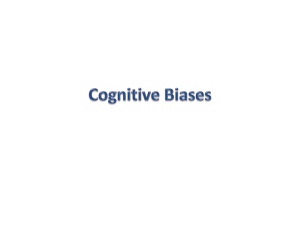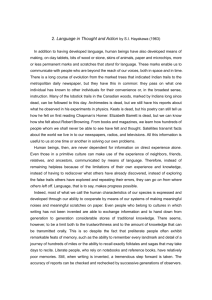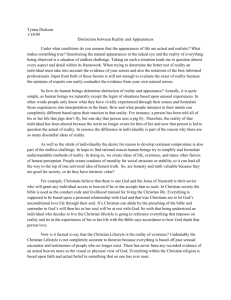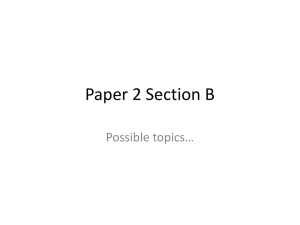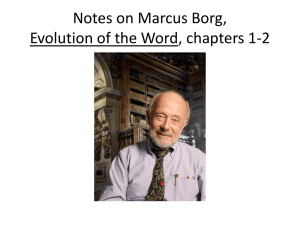ANIMAL EXPERIMENTATION
advertisement
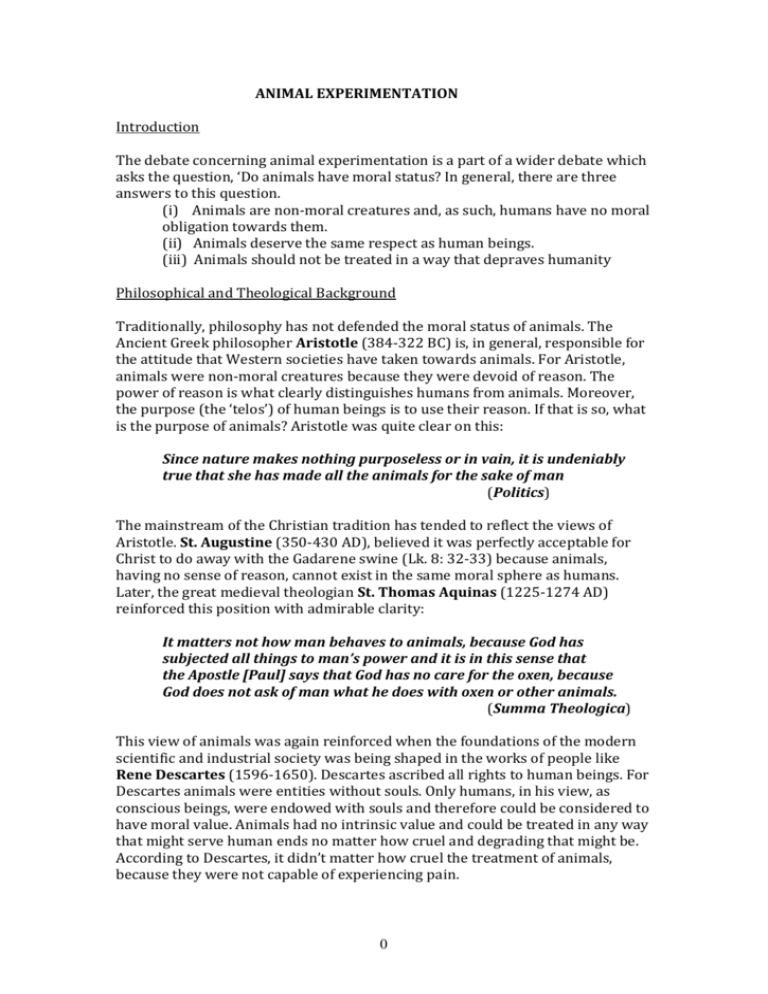
ANIMAL EXPERIMENTATION Introduction The debate concerning animal experimentation is a part of a wider debate which asks the question, ‘Do animals have moral status? In general, there are three answers to this question. (i) Animals are non-moral creatures and, as such, humans have no moral obligation towards them. (ii) Animals deserve the same respect as human beings. (iii) Animals should not be treated in a way that depraves humanity Philosophical and Theological Background Traditionally, philosophy has not defended the moral status of animals. The Ancient Greek philosopher Aristotle (384-322 BC) is, in general, responsible for the attitude that Western societies have taken towards animals. For Aristotle, animals were non-moral creatures because they were devoid of reason. The power of reason is what clearly distinguishes humans from animals. Moreover, the purpose (the ‘telos’) of human beings is to use their reason. If that is so, what is the purpose of animals? Aristotle was quite clear on this: Since nature makes nothing purposeless or in vain, it is undeniably true that she has made all the animals for the sake of man (Politics) The mainstream of the Christian tradition has tended to reflect the views of Aristotle. St. Augustine (350-430 AD), believed it was perfectly acceptable for Christ to do away with the Gadarene swine (Lk. 8: 32-33) because animals, having no sense of reason, cannot exist in the same moral sphere as humans. Later, the great medieval theologian St. Thomas Aquinas (1225-1274 AD) reinforced this position with admirable clarity: It matters not how man behaves to animals, because God has subjected all things to man’s power and it is in this sense that the Apostle [Paul] says that God has no care for the oxen, because God does not ask of man what he does with oxen or other animals. (Summa Theologica) This view of animals was again reinforced when the foundations of the modern scientific and industrial society was being shaped in the works of people like Rene Descartes (1596-1650). Descartes ascribed all rights to human beings. For Descartes animals were entities without souls. Only humans, in his view, as conscious beings, were endowed with souls and therefore could be considered to have moral value. Animals had no intrinsic value and could be treated in any way that might serve human ends no matter how cruel and degrading that might be. According to Descartes, it didn’t matter how cruel the treatment of animals, because they were not capable of experiencing pain. 0 Even Kant (1724-1804), subscribed to the same view: So far as animals are concerned, we have no direct duties. Animals are not self-conscious, and are there merely as a means to an end. That end is man. (Lecture on Ethics). In short, the philosophical tradition of the ‘West’ views animals as creatures created for human beings and as such they can be used as a means of promoting human well-being and betterment. The Christian interpretation of scripture is based, in the main, on the interpretation of the two stories of Creation in the Book of Genesis. (1) What can be called the mainstream of the Christian tradition strongly reinforces Aristotle’s point of view and the philosophical tradition in general. It takes as its point of departure the Creation Story in Genesis 1. From the theological perspective it is argued that humans have intrinsic value because they were made “in the image of God” (Gen. 1: 26-27). Their role is to be “masters of the fish of the sea, the birds of heaven and all living animals on the earth”. Human beings are set apart and superior to animals since only humans are made in God’s image. In other words, the principle of the sanctity of life applies only to human beings. Secondly, human beings are commanded to “dominate the Earth”, traditionally this has been interpreted as giving human beings a licence to do whatever they wish with animals and plants. In effect this tradition, the mainstream of Christianity, upholds that animals lack reason, self-consciousness and hence have no intrinsic worth in themselves. Animals have only instrumental value in so far as they serve the needs of human beings for the necessities of life – that is, unlike human beings who are “an end in themselves” (Kant), animals are only “a means to an end”, the ‘end’ being whatever human society deems appropriate. (2) There is also a strand within the Christian tradition that takes as its point of departure the second story of Creation in Genesis 2. Gen. 2: 15 states: “God took the man and settled him in the garden of Eden to cultivate and take care of it.” This sees human beings as stewards of creation. Within this reading of Genesis, human beings have a duty of care towards animals which is understood as a divine command. The treatment of animals, understood here in the guise of animal experimentation, may be, on this reading, (i) argued against or (ii) allowed as long as proper safeguards with regard to their habitats and suffering are taken into account. Yet, as Clive Ponting points out in his Green History of the World, “the idea that humans have a responsibility to preserve the natural world of which they are mainly guardians has remained a minority tradition.” In the main, when it comes to the treatment of animals, the increasing consciousness of cruelty and the suffering of animals since the 1970s led the Christian tradition to build into its understanding of human nature point (ii) - a duty of care for other creatures based on an increasing appreciation of Genesis 2: 15. 1 Therefore, while the western tradition, which includes the main Christian tradition, tended to see animals as non-moral creatures towards which humans have no moral obligation, in recent times Christianity has moved to the view, in general, that animals should not be treated in a way that depraves humanity that is: animals should be treated ‘humanely’. ANIMAL EXPERIMENTATION A New Christian Response Andrew Linzey “After Noah” (1997) Much of what Christianity believes about animals is derived from the interpretations of the Bible made by Thomas Aquinas in the Middle Ages. Aquinas argued that: ● Animals did not have souls and were, therefore, inferior beings to humans. Consequently, how animals were treated did not matter. ● Animals have only instrumental value, they exist for the sake of man alone. ● Animals have no rights because they do not share our nature. ● Humans therefore have no responsibility towards animals. In After Noah Linzey, along with his co-author the Jewish theologian Dan CohnSherbok, begins by reviewing the traditional position with regard to animals, the tradition of Aristotle and mainstream Christianity. He argues that the use of animals as subjects of experimentation is often justified by appeal to the Christian tradition. “Indeed,” Linzey suggests, “the Jewish and Christian traditions are often singled out for blame in this regard” He then goes on to quote Peter Singer, “It is beyond dispute that mainstream Christianity, for its first 1800 years, put non-human animals outside its sphere of concern.” In Singer’s view this makes Christianity the enemy (he states, “the JudeoChristian tradition is our foe”), but while Linzey acknowledges that traditional Christianity is much to blame for our negative attitude towards and treatment of animals, he also believes there are a number of positive traditions to draw upon. (1). Re-reading the story of creation in Genesis a. God is creator Linzey begins by reminding his readers that God is the creator. This may seem an obvious point, but when Genesis says “In the beginning God created …” it is pointing to a theocentric (God-centred) rather than anthropocentric (human-centred) world. The traditional approach, with its instrumentalist view of creation as a means to our end, (human-centred world) forms no part of the Book of Genesis. As Linzey points out, “Humans are not God: they are not made gods in creation and they are not the goal of creation … The common creatureliness of all creatures is what is affirmed.” 2 b. The Sixth Day Linzey’s first point is that humans were not the only creatures made on the sixth day. Humans share this day with other land animals. This means that if there is an inner and outer circle of creation, the land animals belong to the inner rather than the outer circle. c. Made in God’s Image Clearly humans are important in creation and why they are can be found in the idea that humans alone were created in the image of God. Linzey argues: Much discussion has centred on this notion of image. For centuries its meaning was discerned in one or more physical or mental attribute. Humans were thought to possess the image because they were rational, had the capacity for speech, or possessed certain physical characteristics. Such an understanding of the ‘image of God’ traditionally focused upon what justified human superiority over animals. The identification of a particular characteristic was intended to set humans and animals apart. But, according to Linzey, scholarship has moved quite decisively over the last 50 years to understanding both the ‘image’ and the notion of ‘dominion’ in terms of responsibility. Humans are set over the world to look after it, to care for it, as God would do so. Such an emphasis on human responsibility is further strengthened by Genesis 2 where Adam is commanded “to till the earth and care for it”. This way of reading the story of creation emphasises a creation in harmony, it is free from violence, predation (one animal preying on another for food) and cruelty. The traditional view of the ‘image of God’ tends to emphasise that the sixth day is the end of the story pointing as it does to the idea that human beings must be the summit of creation. But the stress on an ordered harmony between all creatures, including human beings, shows that creation “reaches its consummation and fulfilment – not in the creation of humankind on the sixth day, but in the peace of the Sabbath on the seventh day.” Linzey summarises his view of the story of creation in the following 5 points: 1. God is the Creator of all things, not just humankind but ‘every moving creature that has life’. Animals are the blessed creatures of God. 2. Animals are given their own place in the world. The whole world does not belong to humankind and humankind has no right to the whole earth. 3. Animals are set in relationship with humans symbolised by their creation on the same day. 4. Animals are under the care of humanity which exists to care for the earth and exercise its power only in conformity with God’s will. 5. All created beings were intended ideally to live in peace and harmony: the Sabbath – not the creation of humankind – is the goal of creation. 3
